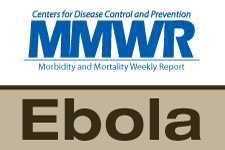Questions and Answers about Ebola for U.S. Businesses, Employers, and Business Travelers
The recommendations on this page are no longer in effect and will not be updated. For current information on workplace safety and health, visit the NIOSH website.
Page Summary
In January 2015, CDC published Interim Guidance for U.S. Businesses, Employers, and Business Travelers to Prevent Exposures to Ebola. This question and answer document highlights some of the key information from that guidance.
What is the risk of Ebola exposure for my employees?
People in most business settings in the United States are not likely to have contact with people with Ebola or have direct contact with Ebola-infected blood or body fluids.
- There is no ongoing Ebola transmission in the United States.
- Passengers traveling from or through countries with widespread transmission or uncertain control measures are screened prior to exiting those countries and again upon entering airports in the United States.
The National Institute for Occupational Safety and Health (NIOSH), the Occupational Safety and Health Administration (OSHA), and the CDC Ebola websites provide guidance for specific groups that may have higher risks of exposure to Ebola because of their work.
What should my business do to educate employees about Ebola?
- Inform employees that the current risk of Ebola exposure is low in workplaces in the United States.
- Educate employees about how Ebola is spread, symptoms, and how to prevent exposure. Also, educate them not to stigmatize people from countries with an Ebola outbreak. Fellow employees or people who have recently traveled are not considered a risk unless they have traveled to countries with widespread transmission or uncertain control measures. Any U.S. employees considered at risk will be monitored by public health authorities.
- Know the monitoring procedures of public health authorities for returning travelers.
What should my business do if essential work requires employees to travel to a country with widespread Ebola transmission or uncertain control measures?
- Explain the implications of traveling to countries with Ebola outbreaks and how that could affect an employee’s ability to return home.
- The U.S. Department of State takes actions through a number of diplomatic channels to protect U.S. citizens who travel outside the United States. However, during an outbreak, any country may enact measures to protect its citizens and to prevent the spread of an outbreak to other countries such as quarantining exposed people, isolating sick people, and screening people entering or exiting the country for sickness or disease exposure. These measures may affect U.S. citizens who appear to be infected with, or may have been exposed to, a serious contagious disease. The ability of the U.S. Department of State to intervene in such situations may be limited. For more information, see U.S. Department of State’s Emergency Resources.
- Travelers may be screened screened [PDF – 1 page] for symptoms of Ebola at airports as they depart countries with Ebola outbreaks and again when entering the United States. Travelers who are sick with symptoms consistent with Ebola or at high risk for exposure to Ebola will not be allowed to travel on commercial flights to or within the United States or potentially to other countries. Travelers returning from countries with an Ebola outbreak who have symptoms may need to be medically evacuated to receive needed care. Check CDC’s Ebola Outbreak often for the most recent information.
- Develop plans and examine policies for required employee travel to countries with Ebola outbreaks. These plans should include provisions for employee medical care and evacuation if such action becomes necessary. Medical evacuation services can be found on the U.S. Department of State’s Air Ambulance/MedEvac/Medical Escort Providers web page.
- Check the CDC Travel Health Notices page for the latest guidance and recommendations on trave, including information about how travelers can protect themselves, the health screening of incoming and outgoing travelers, and restrictions on travel within and between countries.
- Review plans and policies for required employee travel for those returning from countries with Ebola outbreaks. Ensure they are consistent with CDC guidance and the best available science.
- Educate supervisors and workers that the risk of getting Ebola in U.S. workplaces from employees returning from countries with Ebola outbreaks is low, especially if the employee does not have Ebola symptoms.
- Develop plans in case an employee becomes seriously sick while working for the company overseas. Before employees travel, determine the availability of housing, medical care, hospitals, and security in the destination location. Make arrangements for travel insurance and medical evacuations.
- If an employee falls into a risk category after traveling to a country with an Ebola outbreak that could affect his or her ability to be present at work, employers can consider more flexible work arrangements, such as working from home during the active monitoring period. If employees cannot work from home, consider implementing policies that provide full salary and benefits for the time they are required to be away from work.
What should businesses and employers do in the unlikely event that someone is potentially sick with Ebola?
Develop and train employees on a plan, which should include:
- Notifying the state or local health department and your occupational health clinic, and if medical attention is needed, calling 9-1-1 and working with local public health authorities to determine if additional action is needed.
- Isolating the area where the person got sick and make sure that others avoid this area.
- Preventing contact with potentially infectious body fluids like blood, feces, or vomit. Only trained professionals with proper personal protective equipment should clean up contaminated surfaces or infectious body fluids.
- Making a record of everyone who came into contact with the sick employee or customer, and any potentially infectious body fluid.
Where can business and employers get more information?
For more detailed information, see Interim Guidance for U.S. Businesses, Employers, and Business Travelers to Prevent Exposures to Ebola.
See these resources for more information related to Ebola:
- NIOSH Workplace Safety and Health Topics – Ebola
- CDC Ebola website
- OSHA Ebola website
- OSHA Fact Sheet – Cleaning and Decontamination of Ebola on Surfaces [PDF – 4 pages]
- CDC Travel Health Notices website
- CDC Hand Washing website
- CDC Guidance on Monitoring Symptoms and Movement
- CDC Fact Sheet – Monitoring Symptoms and Movement [PDF – 3 pages]
- U.S. Department of State’s Air Ambulance/MedEvac/Medical Escort Providers website
- U.S. Department of State Department Travel Alerts and Warnings website
- Page last reviewed: February 19, 2016
- Page last updated: February 19, 2016
- Content source:




 ShareCompartir
ShareCompartir